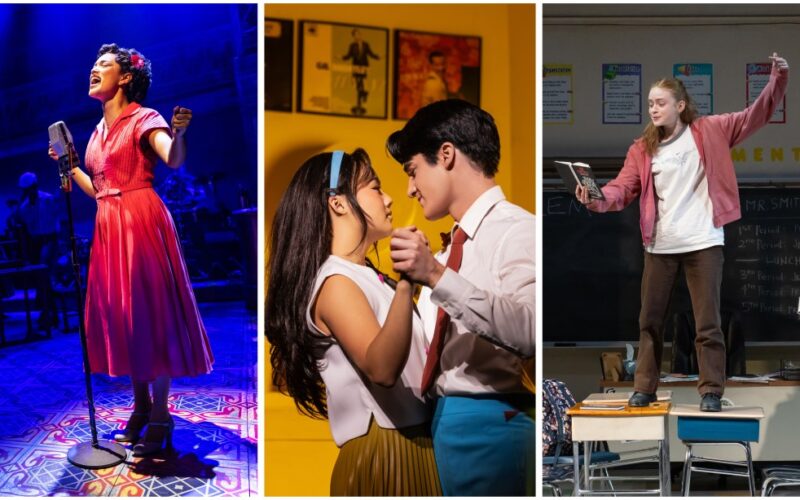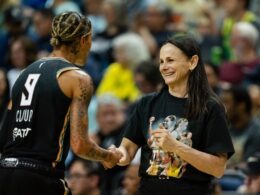Could Jonathan Groff, a knockout Bobby Darin, win back-to-back kudos?
Tony voters are casting their ballots as we speak. So let’s give ’em all a push in the right direction:
Matthey Murphy and Evan Zimmerman
Darren Criss and Helen J. Shen in “Maybe Happy Ending.” (Photos by Matthew Murphy and Evan Zimmerman)
Best New Musical
Oliver and Claire fall in love as their percentages drop, permanently. Thus the show managed simultaneously to tap into the fear we all have of the imminent robotic takeover (Oh, it’s coming) while also avoiding the problem of making a dystopian musical, upon which no-one wants to spend $250 a ticket.
Instead, by making the robots as vulnerable as us, they forged a charming romantic comedy performed by Helen J. Shen (who was robbed of an acting nomination) and Darren Criss (who dove deep into robot-land). Hallmarkian sentiment was avoided. Long may “Maybe Happy Ending” stay charged.

Matthew Murphy
“Buena Vista Social Club” on Broadway. (Photo by Matthew Murphy)
Should/will win: “Maybe Happy Ending.”

Marc J. Franklin
From left: LaTanya Richardson Jackson, Glenn Davis, Kara Young, and Jon Michael Hill in “Purpose.” (Marc J. Franklin)
Best New Play
“Purpose,” which is both still running and more relevant to most Tony voters, is likely to win. Butterworth’s play, though, forged a complex dramaturgical structure and the exploration of deeply empathetic characters. May young writers pay attention. Its central point? To explore how and why childhood trauma impacts our adulthoods.
Butterworth has been writing plays a lot longer than Jacob-Jenkins and his experience shows; I never wanted the perfectly crafted “Hills” to end. On the other hand, there was a raw audacity to “Purpose,” a play that no other writer in the world would have had the guts or the leave to write. It was less polished but seemed more felt.

Julieta Cervantes
“John Proctor is the Villain” on Broadway. (Julieta Cervantes)
Should win: “The Hills of California” or “Purpose.” Will win: “Purpose.”

Julieta Cervantes
Audra McDonald in “Gypsy.” (Julieta Cervantes)
Best Revival of a Musical
I see the arguments against “Sunset Blvd.” and for “Gypsy,” but in the end, Lloyd’s staging was just so audaciously thrilling that it overcame them for me. As a director, he’s obsessed with film but then this is a musical about a movie star, so if ever there was a show that could stand such a metaphoric obsession, then here it was. And, although this may seem counterintuitive, I thought “Gypsy” missed the chance to stage this title with far more Black actors, allowing it to serve as a metaphor for the condition of Black entertainers in early 20th century America. It almost went there, but not quite.
Should win: “Sunset Blvd.” Will win: “Gypsy.”

Joan Marcus
Francis Jue, Marinda Anderson, Kevin Del Aguila, Daniel Dae Kim, Ryan Eggold and Shannon Tyo in “Yellow Face” on Broadway. (Joan Marcus)
Best Revival of a Play
Should/will win: “Yellow Face.”

Marc Brenner
Nicole Scherzinger as Norma Desmond in “Sunset Blvd.” on Broadway. (Marc Brenner)
Best Actress in a Musical
Team Nicole or Team Audra?
Both women were atop revivals (“Gypsy and “Sunset Blvd.”) and both deconstructed iconic characters (Norma Desmond and Madam Rose) using every ounce of their mutually formidable craft. With all due respect to McDonald, I’m Team Nicole (a) because her work was the more radical of the two performances in rescuing Norma from bathetic senility and giving her back her sexuality, and (b) because McDonald’s tragic approach to Rose inevitably deemphasized her chutzpah and self-aware vivacity, which is much of why “Gypsy” is “Gypsy.” Still, no shame in being on the other team.
Should/will win: Nicole Scherzinger.

Matthew Murphy and Evan Zimmerman
Jonathan Groff in “Just in Time.” (Photo by Matthew Murphy and Evan Zimmerman)
Best actor in a musical
Will win: Jeremy Jordan. Should win: Jonathan Groff

Marc Brenner
Sarah Snook in “The Picture of Dorian Gray.” (Marc Brenner)
Best Leading Actress in a Play
Mia Farrow has acted only rarely in the past decade but her empathetic performance as a vegan, pot-growing Iowan in “The Roommate” was a reminder of her astonishing ability to fuse what actors think of as externals and internals: Her work felt deeply authentic but savvy observers also noted the sophistication of her comic technique and dramatic timing. Both weird and Tony-worthy, all the way.

Joan Marcus
(From left) Helena Wilson, Laura Donnelly and Ophelia Lovibond in “The Hills of California.” (Joan Marcus)
And then there was the less-famous Laura Donnelly, who played both a mother and (later) her adult daughter in “The Hills of California,” all in service of the writer’s point that we all eventually have to live the way we were raised. So distinct were these two characters that some punters in my row clearly did not know they were watching the same actress they’d seen in a different role just a few minutes before. Donnelly was at once empathetic and Medea-like in her intensity. In this play, we were supposed to be scared of both of Donnelly’s characters and I swear I could not tell you which terrified me the most. A stunning piece of work.
Sadie Sink has a lot of fans and that was indeed a savvy turn in “John Proctor.” But this competition is between Snook and Donnelly and it was a hard choice for me. Donnelly haunts me the most.
Should win: Laura Donnelly. Will win: Sarah Snook.

Emilio Madrid
Cole Escola in “Oh, Mary!” (Photo by Emilio Madrid)
Best Leading Actor in a Play
George Clooney is on the list of nominees and I hardly need to recount his formidable talents here, but he was fundamentally filmic in “Good Night, and Good Luck” rather than truly translating his subtle version of Edward R. Murrow to a stage the size of the Winter Garden Theatre.
Will/should win: Cole Escola.
Best Direction of a Musical
David Cromer’s work on “Dead Outlaw” was typically detailed and worthy, and Christopher Gattelli wrangled “Death Becomes Her” with witty aplomb but “Maybe Happy Ending” was an eye-popping career high for Michael Arden, who created the most romantic of dreamscapes and yet also insisted that the audience look precisely and only where the director wanted their eyes to be.
Will/should win: Michael Arden.
Best Direction of a Play
Speaking of career highs, Danya Taymor convinced her youthful cast in “John Proctor was a Villain” that the stakes in this high-school English class were a matter of life and death. And then some.
Taymor has to compete with Kip Williams, who employed multiple screens and videographers for what was more conceptual authorship than direction, and Sam Mendes, whose mastery of the exquisite ensemble cast of “The Hills of California” was formidable. Mendes has won many kudos; most Tony voters will want to reward Taymor, a rising talent. Fair enough.
Will win: Danya Taymor. Should win: Sam Mendes.








